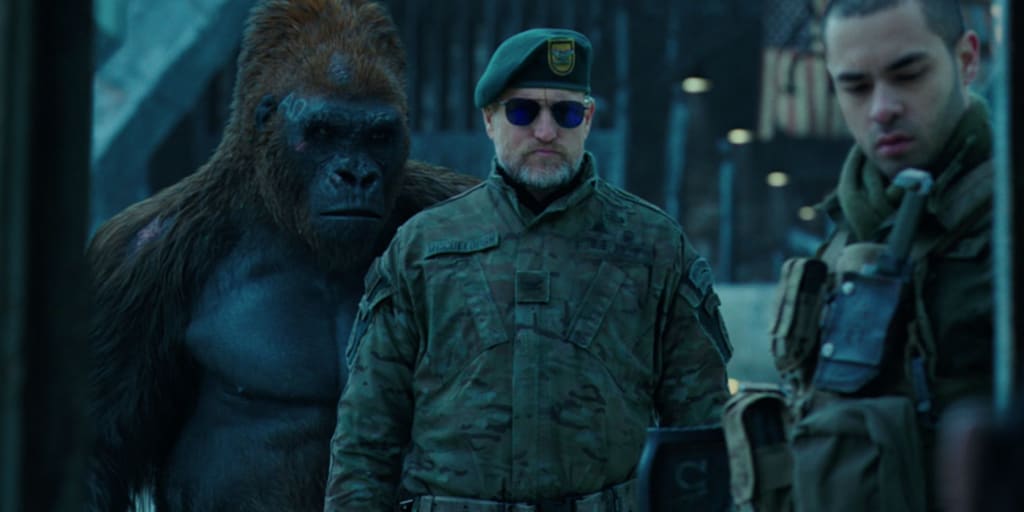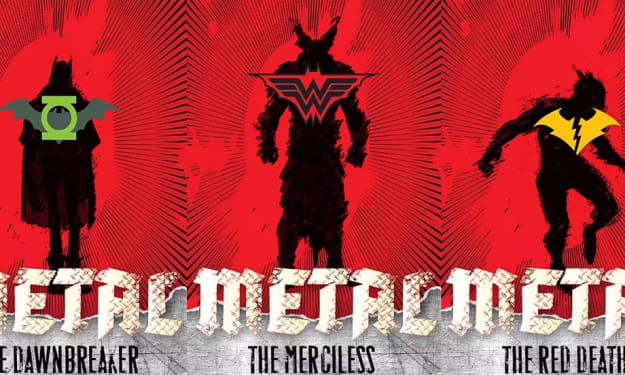
Like the best science-fiction films, War of the Planet of the Apes is a movie with remarkable depth. Characterized by breathtaking action and cutting wit, the film is also surprisingly philosophical. This movie asks a question that seems so very timely today: What does it really mean to be human?
It's impossible to discuss the themes of War For The Planet Of The Apes without indulging in serious spoilers. So be aware: spoilers follow from this point on.
The Irony Of This Question
Let's start by acknowledging the irony of this theme. After all, War of the Planet of the Apes doesn't really star human beings at all; it stars apes. In a world where Earth is shared between the human race and another sentient species, the very question is more than a little species-specific and limiting. Right now, though, we are the only sentient species on the planet (although some would argue that we should count Cetaceans such as dolphins), so we're effectively restricted by our language.
The theme runs through the whole film, but is brought to the surface by Woody Harrelson's Colonel. In one fantastic scene, he outlines the reason for his villainy; he believes the human race is in a battle for survival. The Simian Flu has mutated, and is reducing humans to what he considers "primitives." To the Colonel, these "primitives" have lost everything that makes them human; their capacity for speech, their logical faculties, their reasoning. He admits that, when his own son was infected by the mutated virus, he actually killed him; he could still see the love in his son's eyes, and yet he did not consider him human anymore. So he pulled the trigger.
The Consequence Of Absolute Power
The Colonel is a terrifying villain, and a man who has essentially developed a nationalistic cult around himself. He revels in the absolute power he wields. The "primitives" aren't the only ones he had killed during his power grab; anyone who objected would die as well. The remaining soldiers are stripped of their individuality, and the film deliberately avoids developing them as characters.
Two scenes stand out. The first is when the protagonist Caesar first sees the compound, and discovers apes crucified outside the base. It's frankly chilling, and hauntingly reminiscent of concentration camps. Nobody will be surprised to learn that the Colonel plans to have the apes killed when he's finished working with them; just as the Nazis with the Jews, or the British with the Boers, he doesn't consider the apes "human," and so treats them like filth.
Ultimately, though, there's one moment when we see the result of the Colonel's autocratic philosophy. Later in the film, with the bunker under heavy attack from rival humans, his troops spot apes milling around the compound gates. Incredibly, they switch targets, choosing to kill defenceless apes rather than trade fire with their attackers. Their hatred and fear literally overrides their sense of self-preservation; they would rather kill the defenceless than defend themselves.
This, ultimately, is the result of the Colonel's reign; he has stripped his troops of their humanity. Symbolically, the Colonel himself is infected with the mutated Simian Flu, and Caesar enters to find him attempting to commit suicide. There's a moment when Caesar considers killing the Colonel himself, but he realizes that his vengeance would be hollow, and simply leaves the gun where he left it. The Colonel kills himself rather than live as a "primitive."
The "Primitives" Show Humanity At Its Best
Here's the irony; the minute you question the Colonel's philosophy, it falls apart. It's clear that the "primitives" still retain the core of their identity; by the Colonel's own account, his son retained his love for and trust in his father. In contrast, the Colonel's experience of the mutated Simian Flu leaves him reduced to nothing more than hatred, and he chooses suicide.
Meanwhile, War of the Planet of the Apes focuses in on a specific "primitive" — Amiah Miller's Nova. The character is a familiar one to any long-term fans of the franchise; Nova was a central figure in Pierre Boulle's original novel, La Planète des Singes, and was played by Linda Melson Harrison in the 1968 classic Planet of the Apes.
Nova is nothing but unreserved love and compassion, and it's beautiful to see.
Like the Colonel, Nova is reduced to her core attributes; but they are far more beautiful to behold. She is a girl with compassion, loyalty, and trust. She is willing to forgive even those who shot her father (it's possible that she doesn't even have a concept of vengeance), and willingly gives and receives love. When she witnesses someone she cares for suffering, she can't help but ignore the risk to her own life and go to help. She possesses nothing but unreserved love and compassion, and it's beautiful to see.
In a fascinating scene, Nova reveals that she doesn't aspire to be human. Instead, she wants to be an ape. It's not simply because she sees strength in apes; rather, it's because she sees family. In the apes, she sees all those attributes she shares; love, compassion, and loyalty. This, the film declares, is what it truly means to be human. It isn't a matter of military strength, of nationalistic pride, of bitterness or hatred or anger. No, the core of humanity — the thing worth fighting for, the thing worth preserving — is love.
These Things Endure
The battle is over, the Colonel's fortress has been destroyed, but still we see hatred and fear; when Caesar shows himself, one terrified soldier raises his gun and prepares to fire. That's when an avalanche starts, and the story takes its final philosophical twist.
When the avalanche is over, there is no trace of the Colonel's base, or of the soldiers who opposed him. They might as well not have existed in the first place. In the same way, all those things the Colonel represented will not endure. Hatred and bigotry, prejudice and pride, even the twisted nationalism that defines itself against those it considers to be "other" — they will all be lost, swallowed up by the reality of life.
In contrast, the apes survive, and so does Nova. These beings who represent love and unity, compassion and trust; they endure. It's almost Biblical:
"And now these three remain: Faith, hope, and love. But the greatest of these is love."
Like all the best science fiction, War of the Planet of the Apes is a deeply philosophical film, one with a surprising amount of thematic depth to it. It's a thrill to watch, and attentive viewers will be left fascinated by the concepts and ideas director Matt Reeves works with. On the face of it, the film is the ongoing story of a dystopian reality in which the human race is gradually ceasing to exist. In reality, it's a wonderfully optimistic film with a firm belief that the best of humanity will endure.
About the Creator
Tom Bacon
A prolific writer and film fan, Tom has a deep love of the superhero genre.






Comments
There are no comments for this story
Be the first to respond and start the conversation.